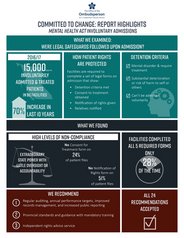Victoria – The legal rights of mentally ill patients involuntarily admitted to psychiatric facilities across the province are being denied according to an investigative report issued by the BC Ombudsperson today.
Ombudsperson Jay Chalke released Special Report No. 42, Committed to Change: Protecting the Rights of Involuntary Patients under the Mental Health Act. The report makes 20 findings highlighting the lack of compliance with the legal documentation required on involuntary admission to designated psychiatric facilities in the province.
"Involuntary detention and treatment is the most intrusive form of mental health care available," said Chalke. "This is a failure to comply with the Mental Health Act, the law that allows people who are gravely ill - our friends, daughters, sons, parents and grandparents – to receive timely treatment while protecting their legal rights," he said adding involuntary admissions are often a necessary last resort for mentally ill people who are at risk of harming themselves or others.
The report’s findings were based on an investigation that reviewed admission records of every involuntary admission in the province that took place in June 2017. A detailed analysis of mandatory admission forms found that across the province, all of the required forms were was completed in only 28% of involuntary patient admissions. The report makes 24 recommendations, all of which have been accepted in principle by government and health authorities.
"Implementing these recommendations will make a significant impact by ensuring that someone who is involuntarily detained receives the best mental health treatment in a manner that is respectful of their human rights," said Chalke. "While the findings in this report are troubling, the commitment by government and the health authorities to the recommendations made is cause for optimism. These changes will help ensure those who are involuntarily detained in B.C. are afforded the same rights that all Canadians expect."
The Ombudsperson will monitor implementation by the provincial government and the health authorities of the recommendations in this report and will report publicly on progress.
The full press release as well as the report can be accessed here.
Source: Canadian Ombudsman

